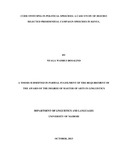| dc.contributor.author | Nyaga, Wambui R | |
| dc.date.accessioned | 2013-11-18T09:10:22Z | |
| dc.date.available | 2013-11-18T09:10:22Z | |
| dc.date.issued | 2013-10 | |
| dc.identifier.citation | Master Of Arts In Linguistics, U niversity of Nirobi, 2013. | en |
| dc.identifier.uri | http://erepository.uonbi.ac.ke:8080/xmlui/handle/123456789/59237 | |
| dc.description.abstract | This study extends the study of code switching to political discourse and in particular
spontenously produced campaign speeches with a view to finding out the motivation for code
switching, types and functions of the same using using Myers (1993) Markedness Model.The
study uses instances of campaign speeches given by presidential candidates Uhuru Kenyata,
Martha Karua and Raila Odinga during the 2012/2013 campaigns in Kenya.
The analysis of the data was done in chapter two and three in the light of the marked choice
maxim in markedness model which is a negotiation against the unmarked (expected) choice
and directs a speaker to call up for another RO set in the place of the expected choice. This
is because our data revealed only instances of marked Code switching. In chapter two we
analysed intrasentential code switching while in Chapter three we analysed intersentential
and tag switching.
It was the finding of this study that the motivation for code switching is; one, to fill a lexical
gap, this showed prominence in our data. Code switching was also used for aesthetic effects
through direct or indirect quotation of the speaker’s words or other person’s words in earlier
incidences. Thirdly, structural flagging as a motivation for code switching was used for
foregrounding and emphasis.
Our study also revealed that code switching to native languages was meant to express ethnic
solidarity with speakers of the same native language. The same could also be used to break
through ethnic barriers even if momentarily.
Instances of intrasentential, intersentential and tag code switching were revealed in our data
with politicians exploiting code switching for both communicative and strategic functions.
These findings are presented in chapter four with recommendations for further study. | en |
| dc.language.iso | en | en |
| dc.publisher | University of Nairobi | en |
| dc.title | Code Switching in Political Speeches: a Case Study of 2012/2013 Selected Presidential Campaign Speeches in Kenya | en |
| dc.type | Thesis | en |
| local.publisher | College of Humanities and Social Sciences | en |

